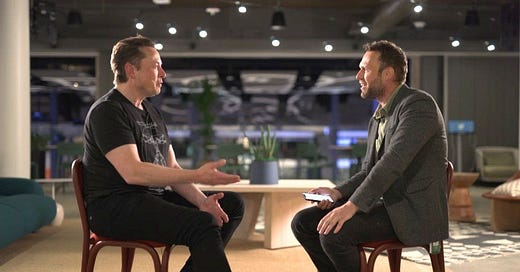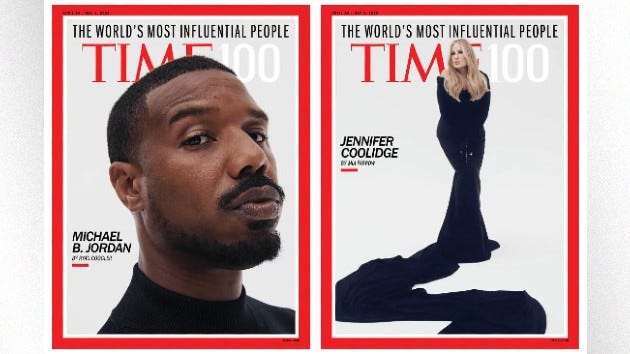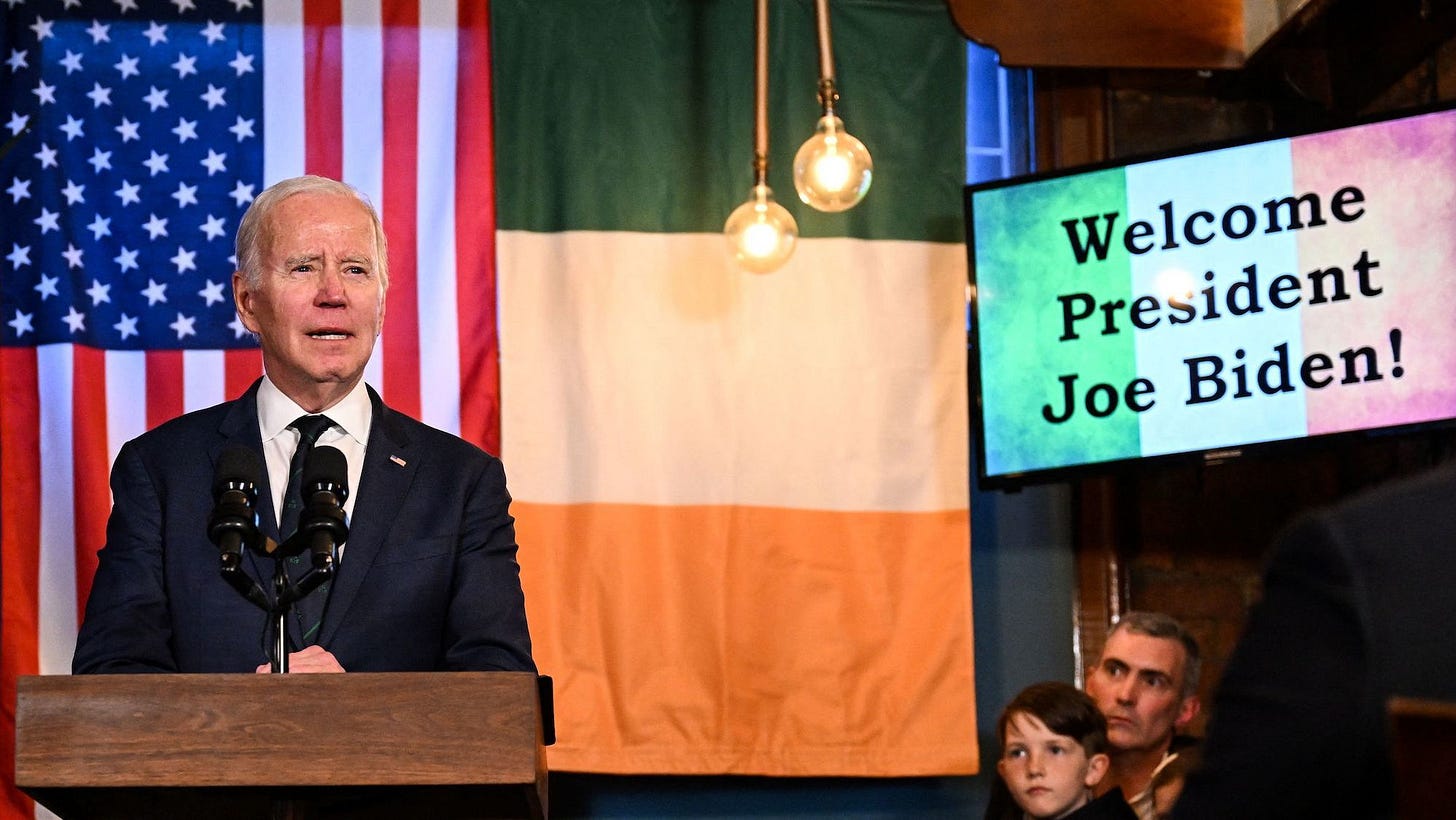Borkowski Weekly Media Trends: Elon Musk, Biden in Ireland & TIME 100
The Good, the Bad, and the Influential, Musk-Read BBC Trend, Biden's Trip to Ireland
Global values shape TIME's top 100
TIME magazine’s annual list of the 100 most influential people in the world is as much a PR exercise for the publication as it is for any of its honourees.
TIME’s attempts to curate a list that signals its values and marries detached historical gravitas with buzz-worthy topicality is in some ways akin to Rolling Stone’s perennially vacillating lists of the best songs and albums of all time, in which the focus of history’s mighty lens is liable to shift drastically towards the trend du jour, however fleeting it may end up being…
There are other values at play for TIME – while America-centric, the list has to have global sensibilities – hence the inclusion of footballers Kylian Mbappe and Lionel Messi.
There’s an argument that – despite having previously included Adolf Hitler and Osama Bin Laden- that the list has to have a progressive bent (in the broadest, establishment-heavy sense of the word) hence the inclusion of the likes of the Syrian swimmer/activist Mardini sisters whose journey to Europe as refugees became The Swimmers.
This also applies to Heads of State like Brazil’s Lula and Australia’s Atony Albanese, despite the fact that, much like President Joe Biden (also included), their greatest contribution to the progressive cause is defeating right-wing extremists in elections by persuading a bare minimum of the electorate that they were the lesser of two evils. That’s not to say it’s entirely hagiographic. For certain people, TIME’s 100 can also act as a Hall of Shame – in this case, that is the clear subtext of Justice Samuel Alito’s inclusion with an entry that focuses on overturning Roe vs Wade.
As with 2022 the list also clearly signals TIME’s allegiance to the Ukraine war with its inclusion of Ukrainian first lady Olena Zelenska and journalist Evan Gershkovich – currently detained in Russia on a flimsy pretext.
The final key aim of the TIME 100 is to attract a new generation to the institution with a series of ‘Down with the Kids’ entries. These can include people whose influence (and social media reach) might take TIME to a new audience – Bella Hadid, Doja Cat, MRBEAST- but also those whose fame transcends showbusiness, media interest and meme culture. Jennifer Coolidge, Nathan Fielder, Lea Michele, Aubrey Plaza and Angela Basset (did the thing!) are all high-achievers in their field, but also the subject of a particularly millennial and Gen Z form of fandom that TIME is transparently trying to court.
BBC lands Musk interview but struggles to keep up
This week the BBC pulled off an impressive coup - landing an exclusive interview with Elon Musk, the first interview in almost six months since he bought Twitter. It followed Twitter’s controversial decision to label the BBC’s account as ‘government funded’, an issue the organisation takes very seriously following Richard Sharp’s ties to Boris and the Gary Lineker impartiality controversy.
The BBC’s James Clayton landed the interview, but on Musk’s terms, leaving Clayton a couple of hours to prepare and hauling him over to Twitter HQ, where Musk sat down with him for 90 minutes, and the interview was broadcast live on Twitter Spaces and BBC’s new channel.
Listening to Musk talk on a ‘traditional’ platform was undoubtedly a change. Much of Musk’s comms comes via brief and cryptic Tweets, so hearing him unmediated - notably not media-trained - created some fascinating insights. For instance, when faced with a tricky question, one of his evasion tactics was to become the interviewer. And this is where we saw Clayton crumble.
https://twitter.com/ABridgen/status/1646150726039621635?s=20
One of the inevitable talking points, the rise of hate speech and misinformation, prompted Musk to reverse the question to the interviewer. Clayton danced around the topic but ultimately failed to combat Musk. He could’ve raised his colleague Marianna Spring’s Panorama discussing the issue at length or shut down the questioning (he is the interviewer after all). The lack of prep was on full display, prompting Musk’s army to declare their leader ‘owned’ Clayton and the BBC.
https://twitter.com/mariannaspring/status/1646082081494036481
Musk enjoys criticising the media, particularly massive institutions like the BBC. One of his missions is to create a more democratic platform where citizen journalists are as trusted as mainstream media. But organisations like the BBC are vital to Twitter’s existence, both from a reputational standpoint and the quality of information - the BBC rigorously trains its staff on impartiality and fact-checking.
Musk has equated ridding Twitter’s bots with clamping down on misinformation for some time, but this is a flimsy argument. There is no silver bullet - he can’t expose Twitter to unrestricted free speech without a spike in fake news. Whilst Clayton made these points in the interview, they were lost in the broader discourse the interview created, especially the BBC coming off slightly worse when Musk directly challenged most of the questions.
But in the long run, the BBC’s colossal spike in traffic will please the executives, and Musk will meme his way through the aftermath to his audience’s delight.
Mr Biden goes to Ireland
American President Joe Biden crossed the Atlantic this week to visit Northern Ireland and Ireland whilst marking the 25th Anniversary of the Good Friday agreement. The delicate political dance required by such a high-profile tour led to various interpretations across the media regarding not only the visit’s overall success, but indeed its true intentions.
Former DUP leader Dame Arlene Foster criticised President Biden for not making the short leap across the Irish Sea during his visit and, more visibly, neglecting to display the Union flag on his enormous bulletproof limousine whilst in Belfast (the Irish Tricolour did fly in Dublin). GB News echoed this sentiment, but the New Statesman’s Finn McRedmond disagreed, writing, “It is those who think celebrating Irishness is the same as demeaning Britishness; that no one could possibly love both; that in this world, diplomacy is a zero-sum game.”
Much has been made previously (quite often by Biden himself) of the current President’s Irish heritage. Once in the Republic, the photo opps of pints, pubs and cheerful crowds were clearly working to reinforce the story of this particularly successful American dream – the descendent of 19th-century Irish immigrants fleeing the potato famine has been raised to the most powerful office in the world.
But whilst the reception in the Emerald Isle might have been characteristically warm, the American media was quick to remind audiences of President Biden’s troubles back home, with abysmal approval ratings and a gruelling election cycle looming. As ABC News wrote during the visit, “No wonder Biden keeps joking about sticking around.”





